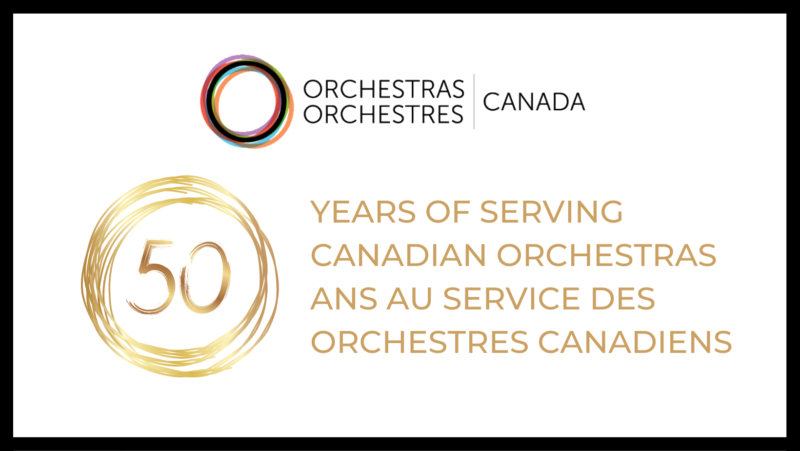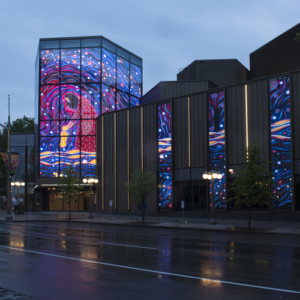Vancouver, Canada (27/9/2023) – Conductor Janna Sailor is the winner of the Orchestras Canada Betty Webster Award for 2023.
???? Watch the Award Announcement on YouTube!
 Janna Sailor was nominated by the Allegra Chamber Orchestra, one of the few all- female orchestras in the world. The award celebrates Janna’s innovative approaches to developing programs and audiences, her quest for equity and representation at every level of the orchestra, her commitment to championing Indigenous artists and creators, and her efforts to build community through music and social justice.
Janna Sailor was nominated by the Allegra Chamber Orchestra, one of the few all- female orchestras in the world. The award celebrates Janna’s innovative approaches to developing programs and audiences, her quest for equity and representation at every level of the orchestra, her commitment to championing Indigenous artists and creators, and her efforts to build community through music and social justice.
The Betty Webster Award was established in 2002 to honour Mrs. Elizabath Webster, C.M. (1925-2018), Orchestras Canada’s founding Executive Director. Past winners include distinguished musicians, volunteers, educators, ensembles, and arts managers: a tribute to Mrs. Webster’s inclusive vision for Canadian orchestras. In 2023, the jury focused on the calibre and impact of the nominees’ contributions to innovation of one or more Canadian orchestras.
Janna Sailor is a conductor and violinist pursuing a diverse career delving into contemporary, world, early music, jazz and improvisation, chamber music and interdisciplinary projects with dancers, visual artists and electronics. She regularly conducts major Canadian orchestras, including Symphony Nova Scotia, Calgary Philharmonic Orchestra, and Saskatoon Symphony. She has also performed with Vancouver Symphony, Victoria Opera, Calgary Philharmonic Orchestra, and many more. Moreover, she has built a number of arts based social initiatives, including instructing disadvantaged youth on Vancouver’s downtown Eastside, fundraising and outreach activities for immigrants, establishing music therapy programs, and founding of the Allegra Chamber Orchestra: an all-female professional ensemble, which regularly commissions, mentors and premiers works by Canadian, female and minority composers.
In response to receiving the award, Janna Sailor said:
“I am deeply grateful and humbled to be selected as the recipient of the 2023 Betty Webster Award, and to Orchestras Canada for their inspired and important efforts in supporting Canadian orchestras, propelling our industry forward as we work together as a community; striving for inclusivity, creativity, and reconciliation.
I am in awe of the accomplishments of the Betty Webster’s past award recipients, and am honoured to be in their company – I will strive to live up to the amazing contributions they have made to the orchestral scene.
To stand on the podium in front of an orchestra is a privilege and beautiful responsibility – and one that I could never take for granted, working together with my fellow artists to make the world a better place through music brings me indescribable joy. I continue to explore and learn alongside my ensembles and those I am privileged to work with, and am deeply grateful that this award will facilitate future exploration and collaboration.”
The award includes a plaque and a donation to an orchestra or a group of the winner’s choosing. Ms. Sailor has asked that this year’s donation be directed to Allegra Chamber Orchestra.
The national jury was chaired by OC board member and Symphony 21 Artistic Director, Jaelem Bhate, and included T. Patrick Carrabré (Composer, Director, UBC School of Music and Chan Centre for the Performing Arts, Orchestras Canada Board member); Jim Tranquilla (Executive Director, Tutta Musica Orchestra & Director of Community Engagement, New Brunswick Youth Orchestra); Marie-France Mathieu (Conductor; Orchestre Philharmonique de la Relève du Québec); and Katelin Coleman (Artistic Director, Artemis Musicians’ Society.).
 Speaking about the Award, jury chair Jaelem Bhate noted, “Janna is a remarkable artist and advocate whose generous spirit and devotion to the betterment of the community through music is inspiring. We were unanimous in our appreciation for her accomplishments and creativity with the Allegra Chamber Orchestra. Her positive impact on the artists and audiences she interacts with was clear from her nomination letters, and I am thrilled that she is this year’s Betty Webster Award winner.”
Speaking about the Award, jury chair Jaelem Bhate noted, “Janna is a remarkable artist and advocate whose generous spirit and devotion to the betterment of the community through music is inspiring. We were unanimous in our appreciation for her accomplishments and creativity with the Allegra Chamber Orchestra. Her positive impact on the artists and audiences she interacts with was clear from her nomination letters, and I am thrilled that she is this year’s Betty Webster Award winner.”
 OC’s Executive Director, Katherine Carleton commented, “Janna Sailor’s vision of a world in which classically-trained musicians can unite their social beliefs with their artistic skills is both compelling and inspiring. I suspect that Betty Webster herself would highly approve!”
OC’s Executive Director, Katherine Carleton commented, “Janna Sailor’s vision of a world in which classically-trained musicians can unite their social beliefs with their artistic skills is both compelling and inspiring. I suspect that Betty Webster herself would highly approve!”


 In short:
In short:  joining the TBS Chorus. In 1999, in the midst of a severe financial crisis, Linda joined the TBSO Board of Directors. In addition to its monetary struggles, the TBSO was searching for both a new Music Director and General Manager. The orchestra was on the verge of collapse. With the assistance of an Interim Music Director, Linda took on governance and administration responsibilities well beyond the volunteer role that she had accepted.
joining the TBS Chorus. In 1999, in the midst of a severe financial crisis, Linda joined the TBSO Board of Directors. In addition to its monetary struggles, the TBSO was searching for both a new Music Director and General Manager. The orchestra was on the verge of collapse. With the assistance of an Interim Music Director, Linda took on governance and administration responsibilities well beyond the volunteer role that she had accepted.

 Since 2013, Orchestras Canada has been privileged to work with Micheline McKay as our government relations consultant. Micheline has served as trusted advisor, analyst and reliable source of information and feedback to the OC staff, board and Advocacy Committee. Her good sense, high ethical standards, discretion, hard work, and political insights have inspired us all. On a personal note, she’s the best and most patient co-writer I’ve ever worked with, handling my relentless editing and wild spins on things with great aplomb. I also recall with great admiration the role she played in our Orchestras on the Hill day in early 2018: the passionate tributes that Minister of Canadian Heritage and the chairs and vice chairs of the Standing Committee on Canadian Heritage paid to orchestras that day came about because of Micheline’s tact and effective organization.
Since 2013, Orchestras Canada has been privileged to work with Micheline McKay as our government relations consultant. Micheline has served as trusted advisor, analyst and reliable source of information and feedback to the OC staff, board and Advocacy Committee. Her good sense, high ethical standards, discretion, hard work, and political insights have inspired us all. On a personal note, she’s the best and most patient co-writer I’ve ever worked with, handling my relentless editing and wild spins on things with great aplomb. I also recall with great admiration the role she played in our Orchestras on the Hill day in early 2018: the passionate tributes that Minister of Canadian Heritage and the chairs and vice chairs of the Standing Committee on Canadian Heritage paid to orchestras that day came about because of Micheline’s tact and effective organization. Starting April 1, we’ll be welcoming Éric Dubeau as OC’s new government relations advisor. Éric, based just outside Montreal, has many years of experience as an arts advocate, political staffer on Parliament Hill, policy wonk, association leader, granting officer, arts consultant, and award-winning singer-songwriter. His unique skills and collaborative, informed approach make him an ideal successor to Micheline, and we can’t wait to get started!
Starting April 1, we’ll be welcoming Éric Dubeau as OC’s new government relations advisor. Éric, based just outside Montreal, has many years of experience as an arts advocate, political staffer on Parliament Hill, policy wonk, association leader, granting officer, arts consultant, and award-winning singer-songwriter. His unique skills and collaborative, informed approach make him an ideal successor to Micheline, and we can’t wait to get started!